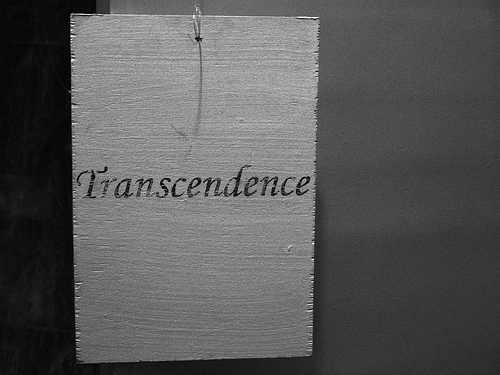We run our website the way we wished the whole internet worked: we provide high quality original content with no ads. We are funded solely by your direct support. Please consider supporting this project.

Crucifying Transcendence
The classical view of God’s transcendence in theology is in large borrowed from a major strand within Hellenistic philosophy. In sharp contrast to ancient Israelites, whose conception of God was entirely based on their experience of God acting dynamically and in self-revelatory ways in history, the concept of God at work in ancient Greek philosophy was a concept that explained all that was not self-explanatory—namely, the contingent, ever-changing, limited, compound world.
This explanation, these philosophers generally assumed, must constitute the antithesis of all that needs to be explained. Hence, for all the significant differences among the Platonic, Stoic, and Peripatetic philosophers who comprise this strand of thought about the nature of God, the logic moved away from contingency, change and composite being and moved toward a reality that was altogether necessary, unchanging, and simple—“the One,” as it came to be known. Contingency, change, and composite being came to be viewed as inferior and less real than that which is necessary, unchanging and simple.
The dominant way these philosophers worked toward their ultimate explanation of God was by attempting to form a conception of a reality, God’s transcendence, that remains when all that is not self-explanatory is stripped away.
The first unambiguous example of this was Anaximander’s concept of aperion – the “indefinite.” By the second and third centuries, it was widely assumed in Hellenistic philosophical circles that God (or “the One”) was altogether simple and “above” contingency, becoming, limitations, emotions and rational thought and possibly time.
The literature debating the extent to which early church fathers were or were not influenced by this concept of God is massive. I will simply make one observation. Contemporary defenders of the early church fathers tend point out that these fathers ascribed activities and attributes to God that are inconsistent with the Hellenistic conception of God and that they significantly modified the meaning of the Hellenistic philosophical concepts that they ascribed to God. I believe these defenses are, to a large degree, successful in refuting the advocates of a strong Hellenistic influence on the church’s theology. But, from my perspective, they fail to see the forest through the trees in terms of the kind of influence that I assert regarding the influence of Hellenistic thought on theology.
My contention is that the influence isn’t at the level of any particular ideas. It concerns the fundamental difference between the Hellenistic conception of God that is arrived at by moving away from the contingent world and the Hebraic conception of God that is received as a revelation as God moves toward, interacts with, and eventually unites himself to the contingent world in the person of Jesus Christ. It’s my contention that, if people start and orient all their theological reflection around the One in whom God united himself to the world of contingent becoming, it would never occur to them to arrive at a conception of God’s transcendence that is the negation of contingency and becoming, —that is, a conception of God’s transcendence as essentially atemporal, immutable, and impassible.
To be more specific, if we resolve that all our reflections about God are to be anchored in the one in whom God became a man, would it ever occur to us to think that God’s essence is above time and devoid of becoming? If our thinking about God never veers from the one who was tortured and crucified at the hands of wicked agents, would it ever occur to us to imagine that God’s essence can’t be affected by anything outside of God? If our thinking about God remains steadfastly focused on the one who suffered a hellish death on the cross, would it ever occur to us to think that God’s essence never suffers? And if all our thinking is oriented around the crucified Christ, would it ever occur to us to imagine a God whose essence had no “before“ or “after” and whose essence had no potential to change, or to be affected?
So far as I can see, the answer to all such questions is a definitive “no.” If all our reflections on God’s transcendence are, from start to finish, focused on the crucified Christ, I believe we are rather empowered to discern God’s glorious transcendence not over-and-against the Crucifixion, but in the Crucifixion itself, precisely when God becomes our sin and the Son experiences abandonment by the Father.
Image by denn via Flickr.
Category: General
Tags: Church Fathers, Cross, Cruciform Theology, God, Jesus, Philosophy, Platonism, Transcendence
Topics: Attributes and Character
Related Reading

The Heavenly Missionary
In his second sermon introducing the ideas in Crucifixion of the Warrior God, Greg suggests a metaphor to help us frame the things we encounter in the Old Testament that seem at odds with the God we find in the life and death of Jesus. God is a heavenly missionary who stoops to accommodate our…

Lighten Up: Jesus Makes Things Hard
Maybe Mark Driscoll is on to something. I guess Jesus really does want to make someone bleed. ;)

If God is already doing the most he can do, how does prayer increase his influence?
Question: If God always does the most that he can in every tragic situation, as you claim in Satan and the Problem of Evil, how can you believe that prayer increases his influence, as you also claim? It seems if you grant that prayer increases God’s influence, you have to deny God was previously doing…

What Does Spiritual Warfare Have To Do with the Cross?
Last week, we covered a few posts on the nature of the Atonement and the Christus Victor view. The following continues this theme, specifically looking the motif of spiritual warfare and how it relates to Christ’s work on the cross. This is an adaptation from Greg’s article in The Nature of the Atonement: Four Views. …

The Old Testament Is NOT on the Same Plane as the New Testament
Paul taught that unbelievers are blinded by “the god of this age” when they read the OT such that “their minds are made dull” and a “veil covers their hearts…when the old covenant is read” (2 Cor. 4:4; 3:14-15). This is why they are unable to see “the light of the knowledge of God’s glory…

Religion that Blinds Us to God
For a variety of reasons, many Jews at the time of Jesus had come to believe that heaven had been closed since the writing of the last book of the Old Testament. God was distant and no longer active among his people. Their religion focused on holding fast to the law God had given in…
